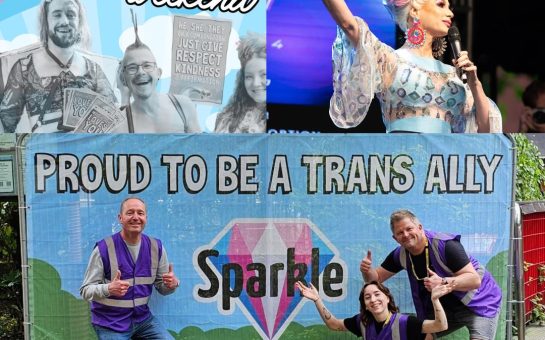Much like every industry, the clothing trade was not immune from hardships during this time. But away from the high street, how has the tailoring and craftsman world fared? From Savile Row to menswear journalists to one-man bands making clothes to order in their front rooms, what challenges did they face, has the ever-conservative Savile Row been forced to adapt as a result and have our wardrobe choices now permanently changed as a result of the pandemic?
Maximillian Mogg – Berlin
Based in Berlin, tailoring house Maximillian Mogg was founded in 2015 by its namesake.
It’s a rather small shop, specialising in tab collared shirts and outrageous double-breasted suits. Max likes to call his menu “timeless menswear.”
Contrary to the usual thought, Max Mogg’s business has actually grown stronger since the pandemic started.
“At the beginning, I think it’s fair to say we were a little bit confused about what happened”, Mogg explained when we spoke over the phone one day. “But I think very quickly after a week or so we decided to use it as an opportunity and ramp up content. We are very strong on social media and on our blog.
“And so we thought let’s do one full article a week and do music playlists once and week and really tackle it, because now people are at home and have a lot of time, let’s entertain them”, he said.
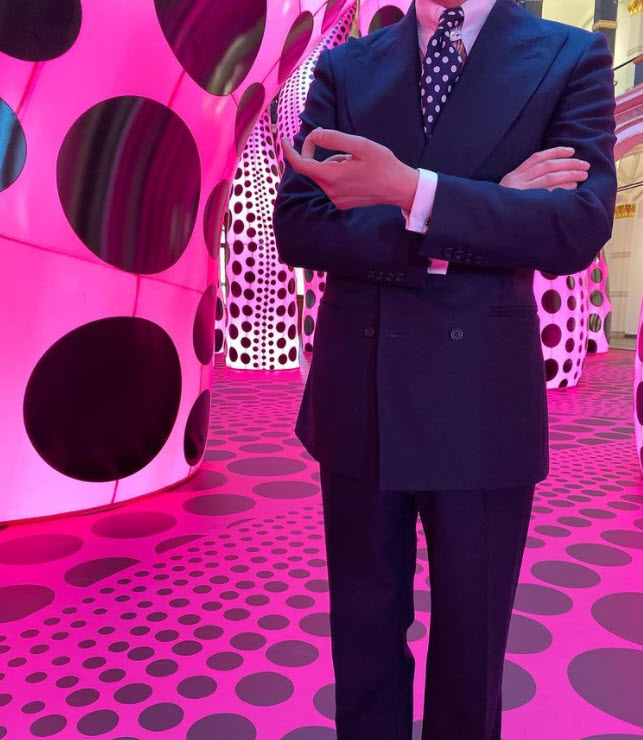
DOUBLE BREASTED IN BERLIN: Max Mogg in a DB suit, tab collared shirt and tie 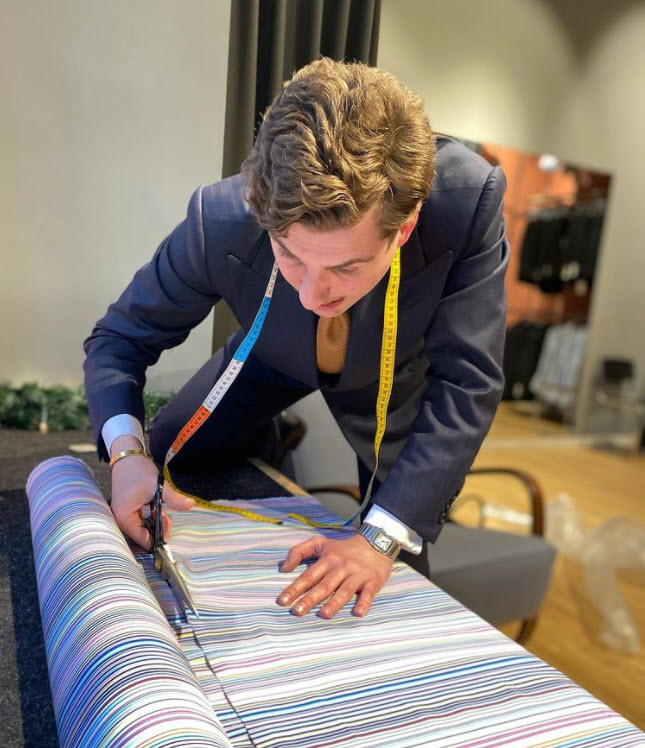
THE CUTTING STAGE: Max Mogg at work in his Berlin studio
During the pandemic, the key word is ‘adapting’. Many tailors feel scared to waiver from their traditional staples of finely cut suits and spread collars.
But Mogg changed his menu to cater to the needs of his clients. If people want pyjamas and morning robes, so be it. That reluctance, living mainly on Savile row, held some tailors back, Mogg felt.
As he explained: “We didn’t sell many chalk- striped suits and business suits obviously, and we thought OK maybe suits are not the best-selling products in a pandemic but what did sell well was our made to measure jeans, our pullovers and pyjamas because that is something people would rather wear than a very formal suit [in a pandemic].
“I can’t blame a customer for not buying a chalk -striped suit in a pandemic, but I can switch my hat around and think OK, what do they actually need.
“And we got a lot of good PR as a positive of that example of something [a tailor] that most people would think would die or suffer very much in a pandemic to actually make a good year of it”, he added.
Jakes Shirts – London
Back in the UK, Jake Wigham makes made to order shirts, ties and now, predictably, face masks all cut and sewn in East London. His shirts are inspired by the preppy Ivy league and Jazz scenes of the 1960s and lead dedicated followers of fashion who want more than just mass-market high street sludge.
As Wigham explained, the pandemic has strangely been a gift for him and much like Maximillian Mogg in Berlin, saw it as an opportunity to set up the business in November.
“The pandemic gave me the free time to be able to set up the company. To be honest, I’ve worked my arse off the whole way through this pandemic and worked harder than I’ve ever worked before because I used to be a trouser maker for a couple of Saville Row tailors, and I always had a really steady flow of work from them”, Wigham said.
“But as soon as lockdown hit, people weren’t buying suits anymore and so I really had to think on my feet. And I just thought, it’s a bit ‘now or never’ type of thing as I’ve always wanted to do what I’m doing now.
“And obviously having that free time and not having the work and obviously needing the money as living in London’s not cheap, so I just had to crack on. But I think I’ve been really lucky that people have still been buying stuff and keyed into what I’ve been doing.”
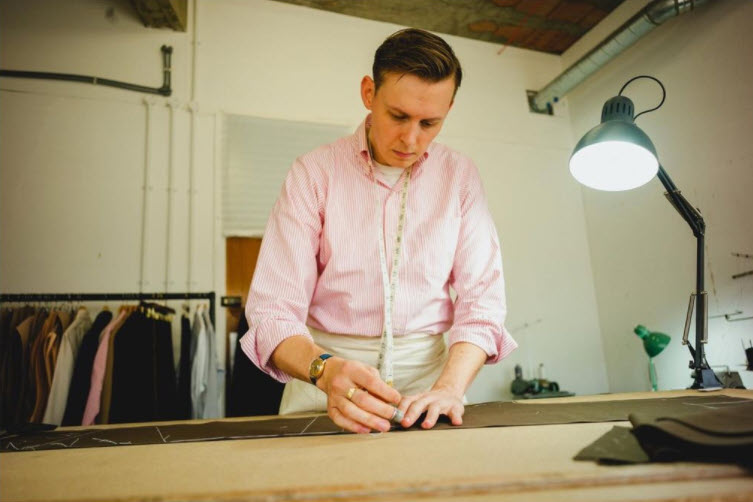
As with most craftsmen and clothiers during this time, they have seen trends of what is and isn’t selling depending on the current Covid restrictions.
Wigham added: “I had quite a good volume of sales from this new batch of shirts and I think that was because of the easing of restrictions mainly. So short-sleeved bold shirts and people are thinking of going back out again and I definitely got more sales through that which was nice.
“I guess a lot of people at home [have been] planning outfits for when they are actually going to be allowed to go out.”
Aleks Cvetkovic – London
If the word of the day has been ‘adapting’, then Savile Row has done no such thing. That is according to Aleks Cvetkovic, menswear journalist and blogger.
The clothing shifts resulting from the pandemic, an increasingly casual world and Brexit uncertainty make these very frail times for the heritage tailors of ‘The Golden Mile.’
“I think tailoring has got a serious image problem”, Cvetkovic said.
“You need a reason to wear suit more so than ever and those reasons just aren’t out there in our society at the moment. That move towards casual style for going out and casual style to work in has been accelerated massively by the pandemic.
“Apart from a wedding or a funeral or a fancy dinner out, when do you want to go and spend £5,000 on a bespoke suit? And once you’ve done that once or twice, what else do you need? I think that very formal end of the market is going to be quite a lot smaller.
“The big issue that I have with a lot of traditional tailoring brands is they’re trying to carry on as though nothing has changed when the world really has moved on.
“It’s easy to forget that people who founded businesses 200-300 years ago were innovators in their day and they grew quickly because they were doing something radical at the time.
“The problem really is that generation of big established businesses in the heritage space that have a slightly older generation at the helm that I don’t think are really open to the idea of trying to make their brand relevant to the next generation.
“To go and shop in a West End tailor is just not a modern experience. I think the street [Saville Row] is entrenching in its heritage and its tradition and I think you can’t do that now”, he added.
Cvetkovic highlighted a growing trend and awareness to support small businesses. A trend that has only accelerated during the pandemic. It seems Jakes Wigham and his shirt making business has benefited from such a change.
He added: “Another strength that Jake has to his bow is the fact that right now we want to support people. I’m much more likely to spend my money somewhere if I feel like I’m supporting a young cool guy doing a good thing than I am supporting an anonymous business with a big shop on Bond Street. That’s probably playing quite nicely into the hands of slightly younger, fresher craftspeople.”
Richard Anderson – London, Savile Row
Richard Anderson is a comparatively young house on The Row, having been founded in 2001.
Yet their founders, Richard Anderson and Brian Lishak are veterans of the trade having worked for the revered Huntsman & Sons established in 1849.
Representing the heritage side of British cloth, Richard Anderson have many overseas clients. An international pandemic obviously made that rather difficult.
Co-founder Lishak explained: “50% of our business is done with export customers, from all over the world. We travel to certain areas to service our customers’ requirements. And obviously with travel being the way it is, we haven’t been able to visit them. So it has been a difficult period. we have racks and racks of clothing awaiting fitting for customers who live abroad.
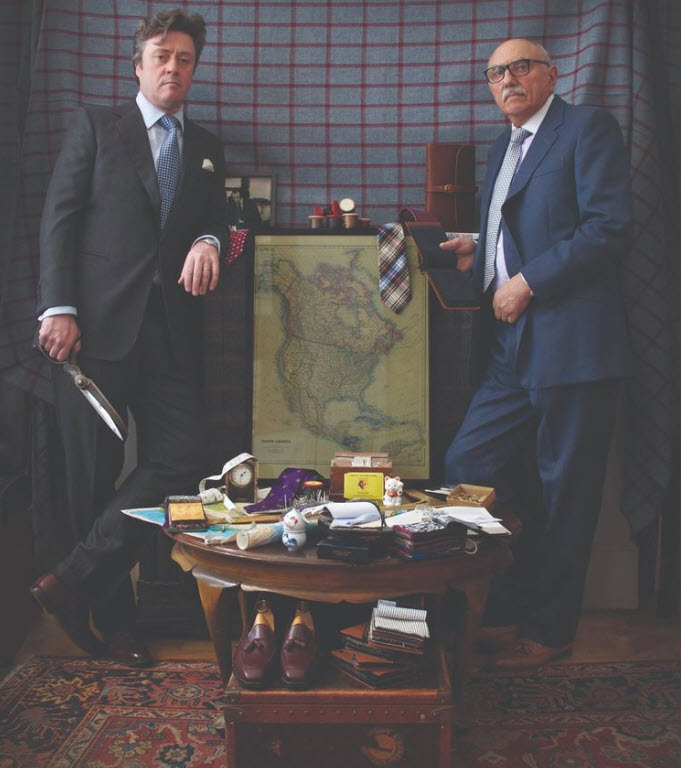
STANDING PROUD: Richard Anderson (left) and Brian Lishak (right) 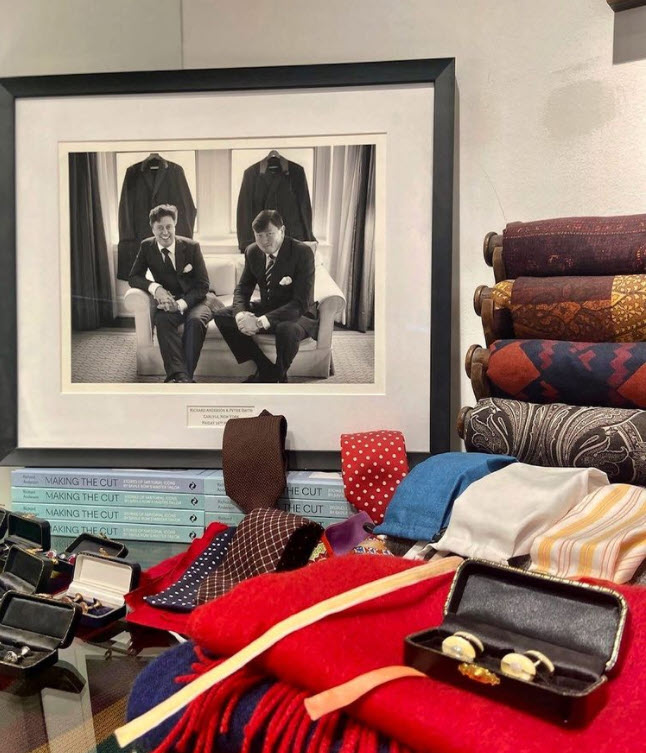
SAVILE ROW FAME: The Richard Anderson stock of accesories
While some maintain Savile Row has an image problem and badly needs modernising, Lishak disagrees.
“We’ve had to adapt which has been a very good thing actually”, he said. “We did fittings, cloth selection and consultations by Zoom. We found shortcuts in getting to our customers which will be very valuable to us in the future.”
“What is important is to be relevant to today. You can’t just produce clothes that you produced 20 years ago; you have to be aware of trends. In fact you have to set trends.
“With regard to the old-fashioned image, yes of course there are some companies who would want to push the fact that they made for Haile Selassie and they’re proud of their heritage but in my opinion, people today are much more impressed by the service and quality they receive.”
While it seems like most are pointing the finger at Savile Row, Lishak believes the finger should be pointed at the government. Has successive governments ignored the Row?
“Oh yes, without a doubt”, Lishak replied. “One of my colleagues spent three years lobbying and he went to the EC [European Commission] because we wanted special dispensation for Savile Row because it’s a very special place. The French got it for Champagne, but we couldn’t get it.
“Personally, I think it’s a great shame that successive governments haven’t made the most of that. If you want Champagne, it’s got to come from a certain region of France.”
Why not the same for Savile Row tailoring?
He continued: “It’s disappointing because it’s something that’s very special and I think it would be a tragedy if our country lost that.
“And now were post-Brexit, we need to be restoring those things because we need to be self-sufficient.
“Boris Johnson wants to reinstall these places that were decimated (Sheffield’s steel, Lancashire’s cotton and silk industry, shipping and fishing) because they all went to the wall.
“But those things that you lose, they’re amazingly important. They’re bastions.
“We should really be encouraging all of those trades, getting people back into work, getting people proud of what they’re producing and rebuild the country because were in different times”, he concluded.
Main image credits: Unplash by Alexander Naglestad
Max Mogg image credits: Instagram
Jake’s Shirts image credits: Instagram
Richard Anderson image credits: Instagram


